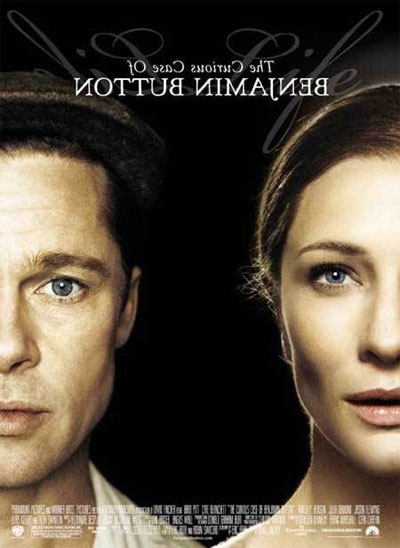 |
The Curious Case of Benjamin Button
Year Released: 2008
Directed by: David Fincher
Starring: Brad Pitt, Cate Blanchett, Taraji P. Henson, Julia Ormond, Jason Flemyng
Production Company: Paramount Pictures
Release Date: December 25, 2008
For all the commercials and teaser trailers Benjamin Button has, it almost lives up to the hype. Now, I’m a big fan of director David Fincher. He’s teamed again with Brad Pitt, who was in Se7en and truly underrated Fight Club. The effects are dazzling, the sets are superb, the actors are on target and the story is old, but the methods are new. So it was a fresh reminder that Hollywood can still pump out some good flicks once in a while.
The film is based on a F. Scott Fitzgerald short story by the same name. The story centers on the title character, born with the physical appearance and mannerisms of a seventy year old man, who ages in reverse. The story is meant as more of a humorous article (well, my interpretation) yet is able to touch on some key items: the main one being that the best years of one’s life is at the beginning and the last years are arduous and painful. Living them in reverse motion seems poetic, or at least in the mechanics of plot, it becomes intriguing and mysterious.
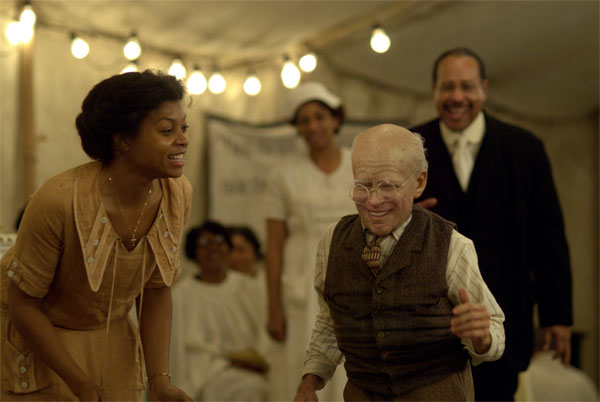 |
| Hang on Ma, I’m getting the Hershey Squirts… |
The movie is a different beast. Rather than take a comedic stance it’s firmly planted as a drama. Even the trailer tagline spells it out: “The wisdom of age, the innocence of youth”. Both however are unattainable by our Benjamin Button played by Brad Pitt. Set in New Orleans 2005, right before the devastation of hurricane Katrina, an dying woman, Daisy (a very old Cate Blanchett) sits with her comforting daughter Caroline (Julia Ormond). Daisy asks Caroline to read back to her a diary of one Benjamin Button, complete with pictures and postcards from all different times of American history. Before the story begins, there’s a necessary plot device, and we’ve found one in the backwards clock created by the blind Mr. Gateau at the end of WWI. Having lost his son, he hopes that he can turn back time in an effort to bring back all the fallen sons the war has taken from all of them.
Hey, it’s a nice little touch.
 |
| Remember when we were in Babel? Man, that was awesome. |
Once Caroline starts reading, it’s all told from Buttons point of view. Button as you know is born an old man, taken in by the kindly Queenie and Tizzy (Taraji P. Henson Tizzy Mahershalalhashbaz Ali); both workers at an old folks home. Since Benjamin is already born an old man, he fits right in at the old folk’s home. This is where he becomes accustomed to death, and feels somewhat unfazed by its cruelty. As time goes on, his body becomes more and rejuvenated, while his mind is the only thing seemingly able to age forwards. He meets his first true love, Daisy (the aforementioned dying lady in the hospital). Its love at first sight, however they don’t ever hook up until their ages are almost in line. Thus, the line in the film ‘we’re almost the same age; we’re meeting in the middle’.
I’ll spare you the details of each adventure Button gets into, so let’s just say he’s been in war, travelled the world, got into Tilda Swinton’s goodies, and oh yeah…ran off to leave his kid with Daisy.
That last point made sense when you’re sitting in a darkened theatre because the choice is purely ‘thematic’. His reasons for leaving his daughter who they reveal to be Caroline, the girl reading the diary to her mother, is that he doesn’t want Daisy to be burdened with having to raise two children. Granted, but Button would have gotten some good mileage, at least 25 – 30 years of seeing his daughter grow up. Instead he runs off to India and other exotic places, sending post cards on every birthday. Now that I’m here writing it out, it seems pretty stupid. I’d like to think most parents would be happy to be there for their kids regardless.
Hey, that’s Hollywood for you.
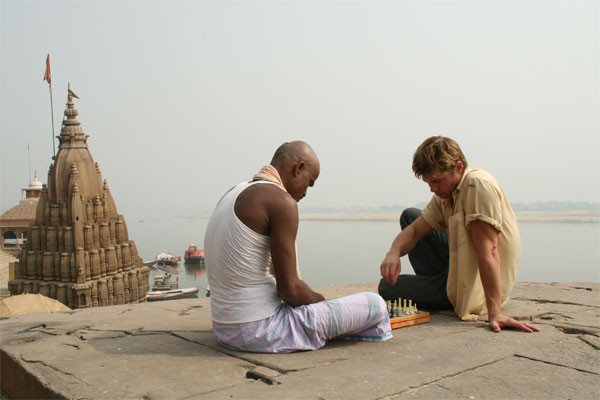 |
| Can I move this white piece to a black square? |
The special effects are incredible; you really believe that Pitt is a gray haired, stooped old man, even a geezer in his 50’s and 60’s. What really amazed me was the amount of work done on the sets of New Orleans, the tiny little details that made every little bit believable. The transitions from decade to decade is subtle yet noticeable, even making Cate Blanchett go from young to old was pretty cool. My only doubt was with the story, penned by the same guy who wrote Forrest Gump. It’s pretty clear he took a lot of the same story structure and planted into Benjamin Button because there’s a central love plot, a recurring object (trading a feather for a humming bird) and replaces the whole mild-retardation thing with a backwards aging character. Regarding the events in the story, Button is merely there to observe, but doesn’t much participate. Trade that off for Forrest Gump who actually got to meet some presidents, play on the American ping pong team, and well, start a whole franchise from one scrimping boat. I can’t really say the same for Benjamin Button, who scowls when he’s old, rides a motor bike when he’s young and tramps around town when he’s younger. Heck, this might be an autobiography. In a nutshell, Button is Forrest Gump, with better cinematography and special effects, but minus all the US presidents.
For some reason, I was spellbound to continue watching even after I had those curious thoughts. Moreover, I think it’s the ability to capture my imagination and hold it for more than 2 1/2 hours, and keep me well entertained. Even if it was a little predictable.
7.0 out of 10


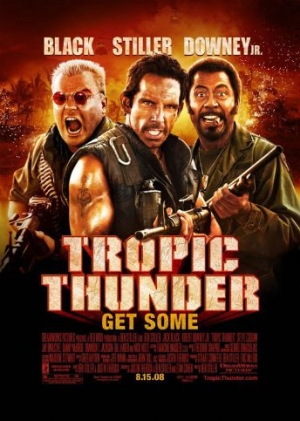
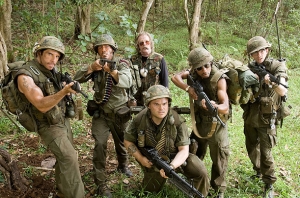
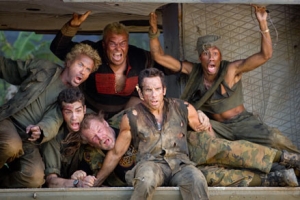






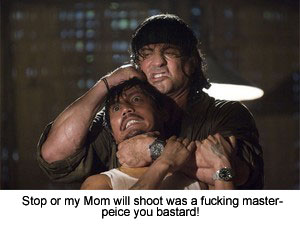




 mlessly. The case becomes personally for Carlin as he is smitten with Claire, a supposed victim of the ferry bombing, as he suspects she had expired a good hour before the bomb exploded. Using the very cool time leaping/folding technology, he focuses his time looking at Claire’s last days. As events unfold, he tries to send himself clues to the past, some of them with disastrous results: the message is there – don’t mess with the past! With hours remaining, and culprit in sight, Carlin decides to take matters into his own hands (what, you thought he was going to sit around?) and steps back into time itself. From there it’s a paradox within a paradox, within a tightly wound story.
mlessly. The case becomes personally for Carlin as he is smitten with Claire, a supposed victim of the ferry bombing, as he suspects she had expired a good hour before the bomb exploded. Using the very cool time leaping/folding technology, he focuses his time looking at Claire’s last days. As events unfold, he tries to send himself clues to the past, some of them with disastrous results: the message is there – don’t mess with the past! With hours remaining, and culprit in sight, Carlin decides to take matters into his own hands (what, you thought he was going to sit around?) and steps back into time itself. From there it’s a paradox within a paradox, within a tightly wound story. n caught myself enjoying Val Kilmer’s performance for a change: could be because he’s taking a back seat to what could have easily been his own starring vehicle. Hey it could happen – if I told you back in 1990 that the star of Turner and Hooch would win an Oscar, you’d shoot me in the face.
n caught myself enjoying Val Kilmer’s performance for a change: could be because he’s taking a back seat to what could have easily been his own starring vehicle. Hey it could happen – if I told you back in 1990 that the star of Turner and Hooch would win an Oscar, you’d shoot me in the face.